
Fourth Annual Logan Symposium Attracts Top Investigative Reporters
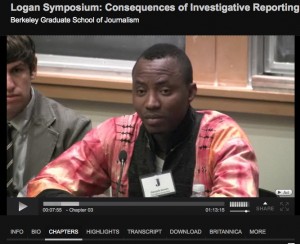 The fourth annual Logan Symposium, April 16 – 18, 2010, the Investigative Reporting Program’s [IRP] annual ‘invite only’ conclave, brought together almost 300 of the nation’s top investigative reporters, editors, producers, media lawyers and industry executives to discuss the state of investigative reporting. Despite years of cuts to newsrooms around the nation, many speakers found optimism in the emergence of new collaborations, nonprofit models for investigative reporting and the recent Pulitzer Prize awarded to ProPublica.
The fourth annual Logan Symposium, April 16 – 18, 2010, the Investigative Reporting Program’s [IRP] annual ‘invite only’ conclave, brought together almost 300 of the nation’s top investigative reporters, editors, producers, media lawyers and industry executives to discuss the state of investigative reporting. Despite years of cuts to newsrooms around the nation, many speakers found optimism in the emergence of new collaborations, nonprofit models for investigative reporting and the recent Pulitzer Prize awarded to ProPublica.
The event received coverage in The Wall Street Journal, PBS MediaShift, the San Francisco Chronicle, The Miami Herald, Variety, Harvard’s Neimen Lab, Newsosaur, Poynter’s Romenesko and El Siglo de Torreon (Mexico).
PBS’ MediaShift described it as “flat out inspiring. The folks here are doing the hardcore, courageous investigative journalism that takes on powerful interests, asks vital questions, and in many cases puts their finances, their safety, and their health on the line.”
You can watch all the panel discussions at Fora.tv. Or view the Logan 2010 photo slideshow here.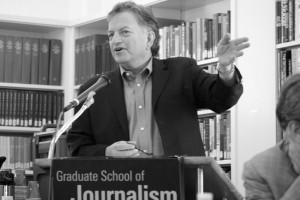 The Symposium began on Friday, April 16 with two panels dedicated to “how the sausage is made.” Reporters and producers, editors and experts spoke, argued and answered questions about their approach to investigative reporting. The panels included Pulitzer Prize winners and broadcasters with duPonts and Emmys, Polk Awards and Peabodys crowding their shelves. Participants came from The New York Times, ABC News, Reuters, Mother Jones, The Philadelphia Inquirer, The Center for Public Integrity, and The Seattle Times, among others. [Watch Panel]
The Symposium began on Friday, April 16 with two panels dedicated to “how the sausage is made.” Reporters and producers, editors and experts spoke, argued and answered questions about their approach to investigative reporting. The panels included Pulitzer Prize winners and broadcasters with duPonts and Emmys, Polk Awards and Peabodys crowding their shelves. Participants came from The New York Times, ABC News, Reuters, Mother Jones, The Philadelphia Inquirer, The Center for Public Integrity, and The Seattle Times, among others. [Watch Panel]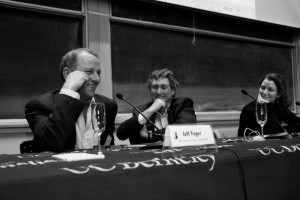 Following a reception that evening, the executive producers of CBS’ “60 Minutes” and PBS’ “Frontline,” two of the last broadcast programs left standing that provide cutting-edge investigative reporting, screened recent projects and discussed the state of investigative reporting on TV. Dean Neil Henry was the moderator. [Watch Panel]
Following a reception that evening, the executive producers of CBS’ “60 Minutes” and PBS’ “Frontline,” two of the last broadcast programs left standing that provide cutting-edge investigative reporting, screened recent projects and discussed the state of investigative reporting on TV. Dean Neil Henry was the moderator. [Watch Panel]
The watchword these days in investigative reporting is ‘collaboration,’ so Saturday’s first panel featured representatives of NPR, ProPublica, The New York Times, PBS “NewsHour” and the “California Watch” project of the Center for Investigative Reporting talking about the successes and failures they have had with collaborative projects. [Watch Panel]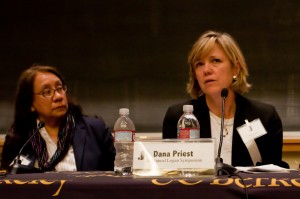 Undoubtedly one of the highlights of the weekend was a moving panel on the consequences of investigative reporting including journalists from Sahara Reporters, the Medill Innocence Project at Northwestern, The Washington Post, The Las Vegas Review-Journal and The El Paso Times discussing the dangers investigative reporters and their sources face. Their experiences range from threat to life and limb reporting on corruption in Africa, to subpoenas aimed at a journalism professor and his students for attempting to bring to light a miscarriage of justice. A veteran reporter in Las Vegas spoke candidly about the cost to his family for taking on casino moguls and organized crime; while a reporter covering the U.S./Mexico border explained the dangerous realities in working amidst a true drug war. [Watch Panel]
Undoubtedly one of the highlights of the weekend was a moving panel on the consequences of investigative reporting including journalists from Sahara Reporters, the Medill Innocence Project at Northwestern, The Washington Post, The Las Vegas Review-Journal and The El Paso Times discussing the dangers investigative reporters and their sources face. Their experiences range from threat to life and limb reporting on corruption in Africa, to subpoenas aimed at a journalism professor and his students for attempting to bring to light a miscarriage of justice. A veteran reporter in Las Vegas spoke candidly about the cost to his family for taking on casino moguls and organized crime; while a reporter covering the U.S./Mexico border explained the dangerous realities in working amidst a true drug war. [Watch Panel]
Saturday’s panels concluded with a heated debate about how we will finance investigative reporting in the future. Bluntly, who will put up the cash? We heard from the new CEO of the Bay Citizen, the founding father and funder of the new Texas Tribune, the Executive Director of the Center for Investigative Reporting, consultant Alan Mutter and former Washington Post editor Len Downie who recently wrote an extensive report about the future of journalism. [Watch Panel]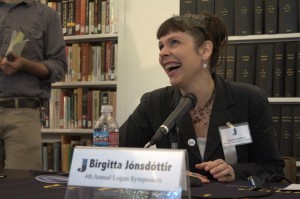 Sunday morning was dedicated to new initiatives in investigative reporting – from a proposal by a Member of Parliament of Iceland to build a ‘safe haven’ for journalists, to plans at American University in Washington to build a global social network of investigative reporters. The head of WikiLeaks, Julian Assange, very much in the news for the release of video showing the killing by US soldiers of a Reuters camera crew in Iraq, spoke about his website’s blend of journalism, activism and cryptography, and Google presented its project aimed at organizing and displaying the world’s public data. [Watch Panel]
Sunday morning was dedicated to new initiatives in investigative reporting – from a proposal by a Member of Parliament of Iceland to build a ‘safe haven’ for journalists, to plans at American University in Washington to build a global social network of investigative reporters. The head of WikiLeaks, Julian Assange, very much in the news for the release of video showing the killing by US soldiers of a Reuters camera crew in Iraq, spoke about his website’s blend of journalism, activism and cryptography, and Google presented its project aimed at organizing and displaying the world’s public data. [Watch Panel]
The weekend concluded with a breakout meeting in the School Library Sunday afternoon designed for those reporting on Mexico and the current crisis on the border including: Tyche Hendricks, UC Berkeley; Andrew Becker, Center for Investigative Reporting; Vincente Calderon, Tijuanapress.com; Susan Ferriss, Sacramento Bee; Amy Isackson, KPBS, San Diego; Angela Kocherga, KHOU-TV, Houston; Raul Ramirez, KQED, San Francisco; Ricardo Sandoval Palos, Center for Public Integrity; Dianne Solis, Dallas Morning News; Diana Washington Valdez, El Paso Times and Josh Wilson, NewsDESK.org.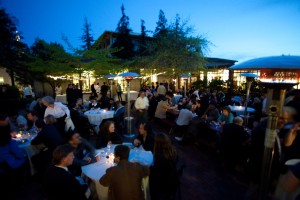 The 2010 Logan Symposium was sponsored by The Reva and David Logan Foundation, the Center for Investigative Reporting and Google with travel grants from the Ford Foundation and the William Penn Foundation. Additional funding came from James Carruthers, Rita and Ian Isaacs, and Kekst and Co. The IRP hosted the event in partnership with PBS’ “Frontline.” A special thanks to event producers Hanni Chehak, Dan Hirst and Marlena Telvick as well as J-School staff and student volunteers for making the event a success.
The 2010 Logan Symposium was sponsored by The Reva and David Logan Foundation, the Center for Investigative Reporting and Google with travel grants from the Ford Foundation and the William Penn Foundation. Additional funding came from James Carruthers, Rita and Ian Isaacs, and Kekst and Co. The IRP hosted the event in partnership with PBS’ “Frontline.” A special thanks to event producers Hanni Chehak, Dan Hirst and Marlena Telvick as well as J-School staff and student volunteers for making the event a success.


